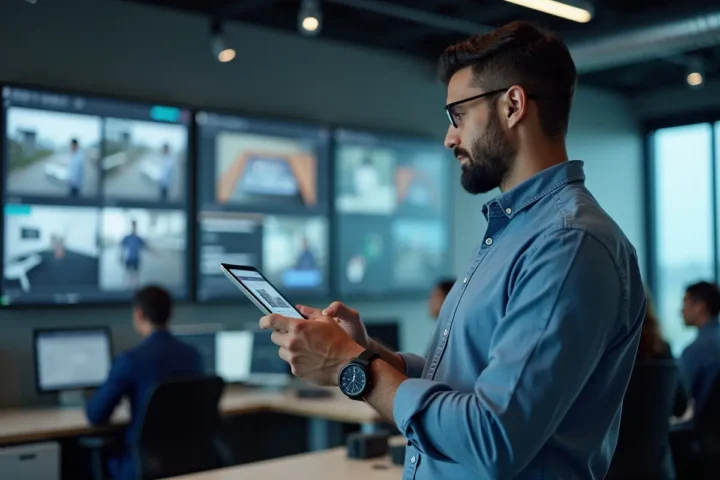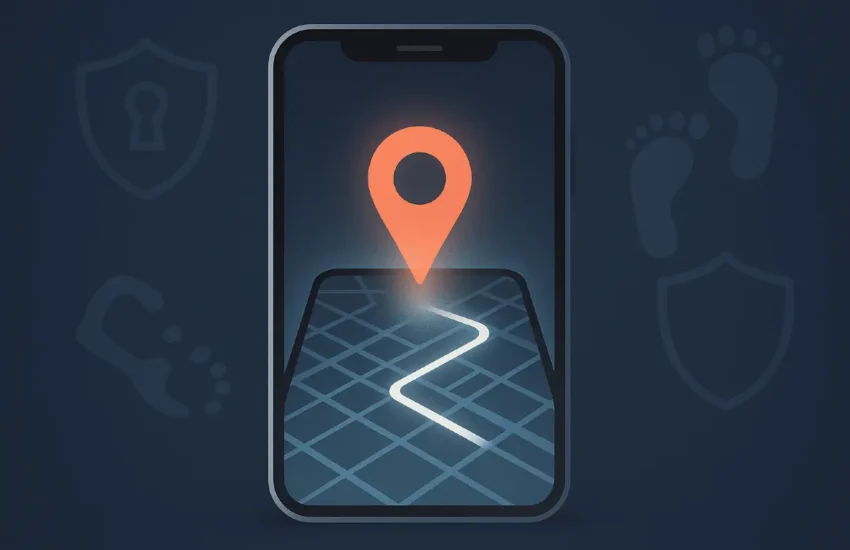The Evolving Role of Private Security: How Technology is Changing Services
In an age where technology is rapidly advancing, the role of private security is evolving at an unprecedented pace. As we move into 2024, the integration of tech solutions into security operations is reshaping how security companies operate and deliver their services.
Let’s dive into how this changing landscape is influencing the private security industry and the vital role it plays in safeguarding our safety.

Understanding the Evolving Landscape of Security
The definition of private security is broad and continually evolving. Traditionally, it encompassed services primarily focused on the presence of security personnel, like guards and patrols. However, the landscape is shifting as technology becomes an integral part of security strategies.
Today’s private security services not only include physical security measures like armed security but also extend into high-tech solutions such as cybersecurity and AI-driven analytics. This evolution highlights the necessity for security professionals to adapt and integrate new tools to combat emerging security threats effectively.
The Definition of Private Security
Private security refers to a range of services designed to protect individuals, property, and assets from potential risks and vulnerabilities. Historically, this meant having security officers on-site to deter breaches or respond to incidents.
However, as the industry evolves, the definition now encompasses a blend of traditional security measures and advanced technological solutions. Security companies are investing in tools like drones for surveillance and real-time threat detection, thereby enhancing their capability to monitor and respond to incidents.
The modern security landscape demands a more comprehensive approach, where the role of private security extends beyond mere presence to include innovative strategies that utilize technology to safeguard against evolving threats.
The Growing Importance of Security Services
The demand for security services has surged in recent years, driven by the increasing complexity of security threats in both public and private sectors. As organizations face higher risks, the importance of effective security solutions has never been greater. This growing demand compels private security companies to stay ahead by adopting advanced technologies that streamline security operations.
Partnering with Global Risk Solutions Security ensures access to top-tier security expertise, offering both physical protection and robust cybersecurity measures. The rise of cyber threats, in particular, has made cybersecurity an indispensable part of security strategies, ensuring comprehensive safety and security across all fronts.
Key Trends in the Private Security Industry
The private security industry is witnessing several key trends that are shaping its future. One significant trend is the integration of artificial intelligence and analytics into security operations, enabling security companies to predict and respond to threats effectively.
Furthermore, the use of drones for surveillance and monitoring has become commonplace, offering real-time insights that enhance situational awareness.
As technology continues to evolve, private security personnel are also adapting their skill sets, learning to navigate new tools and techniques. This transformation is not just about upgrading equipment; it’s also about redefining the roles and responsibilities of security professionals to meet the dynamic landscape of security threats.
Technology and Its Impact on Private Security Services
Innovative Solutions in Security Systems
The private security industry is undergoing a significant transformation, thanks to the introduction of innovative solutions that enhance safety and efficiency. Security companies are now investing heavily in advanced technologies that improve their security operations and threat detection capabilities.
One of the standout advancements is AI-powered surveillance, which utilizes smart cameras to detect suspicious activity in real-time, allowing security teams to respond promptly to potential breaches.
Additionally, remote monitoring systems provide 24/7 oversight, ensuring that vulnerabilities are addressed immediately. Body cameras further elevate the accountability of security personnel, documenting incidents and reinforcing the integrity of security services.
These technological advancements are not just trends; they represent the future of private security services, evolving to meet the demands of an increasingly complex security landscape.
The Role of Drones in Enhancing Security
Drones have carved out a pivotal role in the realm of private security, revolutionizing how security operations monitor large areas and assess situations post-incident. These flying devices are becoming indispensable tools for security companies, allowing for effective surveillance of hard-to-reach locations that traditional methods struggle to cover.
Drones provide a bird’s-eye view that enhances situational awareness, enabling security teams to respond more effectively to emerging threats. Whether it’s monitoring crowded events or patrolling vast properties, the use of drones enhances the overall capability of security operations.
As the technology surrounding drones continues to evolve, their integration into security services will likely expand, further solidifying their importance in safeguarding public and private interests.
How Technology is Changing Security Personnel Roles
The increasing reliance on technology is reshaping the roles of security personnel, leading to professionalization across the private security sector. With tech advancements, security guards are shifting from traditional patrolling duties to monitoring sophisticated surveillance systems, which allows them to focus on analyzing data and responding to alerts.
This shift not only improves working conditions for security officers but also opens doors for greater gender diversity in an industry historically dominated by men. Moreover, the use of electronic payment systems enhances transparency, ensuring that salaries are promptly paid and that social security contributions are made by employers.
As accountability rises through the use of tools like body cameras, the evolving role of security personnel is becoming more crucial in preventing violence and abuses, ultimately fostering a safer environment for all.
The Future of Private Security: Predictions for 2024 and Beyond
Emerging Security Technologies to Watch
As we look ahead to 2024, the landscape of private security is set to be transformed by a host of emerging technologies that promise to revolutionize security operations. Security companies are increasingly investing in artificial intelligence (AI) and advanced analytics, which enable them to detect threats in real time more efficiently than ever before.
With innovations like AI-driven video surveillance, security professionals can identify patterns and anomalies that human eyes may miss, significantly enhancing threat detection capabilities. The integration of drones for aerial surveillance is also on the rise, providing an expanded view of security operations, especially in hard-to-access areas.
As these technologies evolve, they will play an essential role in safeguarding both public and private interests, ensuring that security service providers stay ahead of potential vulnerabilities.
Shifts in the Private Security Sector
The private security sector is witnessing significant shifts as it adapts to meet the demands of a changing world. With the growing complexity of security threats, security companies are now focusing on more than just physical security measures.
The rise in demand for cybersecurity solutions highlights a crucial evolution in the role of private security, as firms strive to protect against cyber breaches and data vulnerabilities. Additionally, integrating advanced technologies allows security personnel to operate more efficiently, reducing the need for large teams while enhancing effectiveness.
As the industry moves forward, the emphasis on innovative security strategies will be vital for addressing emerging risks and ensuring the safety and security of clients across both public and private sectors.
The Evolving Role of Personal Security Services
Personal security services are evolving to meet the dynamic needs of individuals and organizations alike. With the rise of high-profile incidents and increased awareness of personal safety, there’s a growing demand for tailored security solutions that go beyond traditional measures.
Security professionals are now expected to provide comprehensive assessments that integrate physical security, risk management, and advanced technology. This holistic approach not only enhances the effectiveness of security services but also fosters greater trust and satisfaction among clients.
As personal security continues to evolve, the ability to adapt and incorporate innovative solutions will be crucial for security companies looking to thrive in an increasingly competitive environment.
Hiring Private Security: What to Consider
Choosing the Right Security Companies
When it comes to hiring private security, selecting the right security company is paramount. With numerous options available, it’s important to assess each firm’s expertise and track record in dealing with security threats effectively.
Factors such as the company’s experience in event security, the types of security measures they employ, and their ability to integrate technology like AI and drones into their operations should be carefully evaluated.
Additionally, understanding their approach to cybersecurity is essential, especially in today’s digital age where threats can come from multiple fronts. A reliable security company should demonstrate a commitment to both physical and cyber safety, ensuring that it can safeguard clients against evolving risks.
Assessing the Needs for Private Security Services
Before hiring a private security service, it’s crucial to assess your specific needs. This involves identifying potential vulnerabilities and understanding the nature of the threats you face, whether they stem from cyber breaches or physical risks.
Engaging in a thorough risk assessment allows you to tailor security measures that align with your unique requirements. Consider factors such as the scale of operations, the necessity for armed security, and whether you require ongoing surveillance or temporary event security.
In high-risk situations involving theft, confrontation, or valuable assets, Armed Security Service personnel offer elevated protection. Trained professionals ensure swift, decisive responses while deterring potential threats, safeguarding both people and property, and maintaining a strong sense of safety and control. Therefore, by clearly defining your needs and evaluating the potential risks, you will be in a better position to choose a security provider that can deliver tailored solutions to protect your assets and ensure safety and security effectively.
Evaluating the Effectiveness of Security Solutions
Evaluating the effectiveness of security solutions is a vital step in ensuring that your investment in private security is worthwhile. This involves monitoring the performance of security personnel, the reliability of technology employed, and the overall response to security incidents.
Key performance indicators can include response times to breaches, incident reporting accuracy, and the ability to adapt to new threats. Regular assessments and feedback loops should be established to gauge how well security measures are working.
By continually evaluating security solutions, organizations can make necessary adjustments, ensuring that they remain protected against evolving threats in both the private and public sectors.


